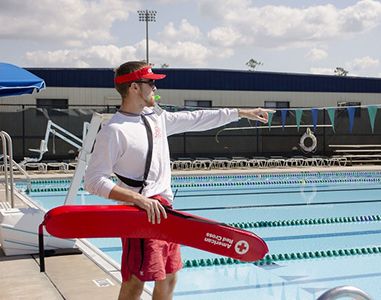In the world of lifeguarding, the ability to save lives goes beyond just knowing how to perform CPR or swim effectively. It encompasses a range of leadership skills that are essential for managing a team, especially in high-pressure environments like pools and beaches life guard. Whether you’re a seasoned lifeguard or just starting your journey, honing these skills can make you not only a better lifeguard but also an effective leader.

1. Communication: The Cornerstone of Team Dynamics
Effective communication is critical in any leadership role, but it’s especially vital in lifeguarding. Clear, concise instructions can mean the difference between a successful rescue and a tragic outcome.
- Active Listening: Encourage team members to voice their concerns or suggestions. This builds trust and fosters an environment where everyone feels valued.
- Regular Briefings: Hold daily meetings to discuss potential challenges, updates, and protocols. Keeping everyone informed ensures that your team operates smoothly and efficiently.
2. Decision-Making: Staying Calm Under Pressure
As a lifeguard, you’ll often have to make quick decisions in stressful situations. Strong leadership involves the ability to assess a situation rapidly and determine the best course of action.
- Prioritize Safety: Always place the safety of swimmers and your team at the forefront of any decision.
- Involve Your Team: When possible, consult with your team before making major decisions. This not only strengthens your leadership but also empowers your teammates to take ownership of their roles.
3. Conflict Resolution: Navigating Team Dynamics
Conflict can arise in any team setting. As a leader, your role is to manage these disputes effectively and maintain a positive work environment.
- Stay Neutral: When addressing conflicts, remain impartial and focus on the issue at hand rather than personal feelings.
- Encourage Open Dialogue: Allow team members to express their viewpoints and work together to find a resolution. This collaborative approach not only resolves conflicts but also strengthens team cohesion.
4. Delegation: Empowering Your Team
Great leaders know how to delegate tasks effectively. This not only ensures that work is completed efficiently but also allows team members to develop their skills.
- Recognize Strengths: Understand the unique strengths of each team member and assign tasks that align with those abilities.
- Trust Your Team: Once you’ve delegated a task, step back and allow your team to execute it. Micromanaging can undermine their confidence and hinder team performance.
5. Motivation: Inspiring Excellence
Keeping your team motivated is crucial for maintaining high standards in lifeguarding. A motivated team is more likely to perform well and respond positively in emergencies.
- Set Clear Goals: Define specific, achievable objectives for your team. Celebrate milestones to keep morale high.
- Lead by Example: Demonstrate the work ethic and attitude you expect from your team. Your enthusiasm can be contagious!
6. Adaptability: Embracing Change
The aquatic environment is dynamic, and conditions can change rapidly. A strong leader must be adaptable and ready to adjust strategies as needed.
- Stay Informed: Keep up with weather conditions, pool usage patterns, and local regulations to anticipate changes.
- Be Flexible: Encourage your team to remain flexible in their roles and responsibilities, ready to pivot when circumstances require it.
Conclusion: Building a Cohesive Team
Lifeguard leadership is not just about individual skills; it’s about fostering a cohesive team that works together to ensure safety and excellence. By enhancing communication, decision-making, conflict resolution, delegation, motivation, and adaptability, you’ll not only improve your effectiveness as a lifeguard but also create an environment where your team can thrive.
